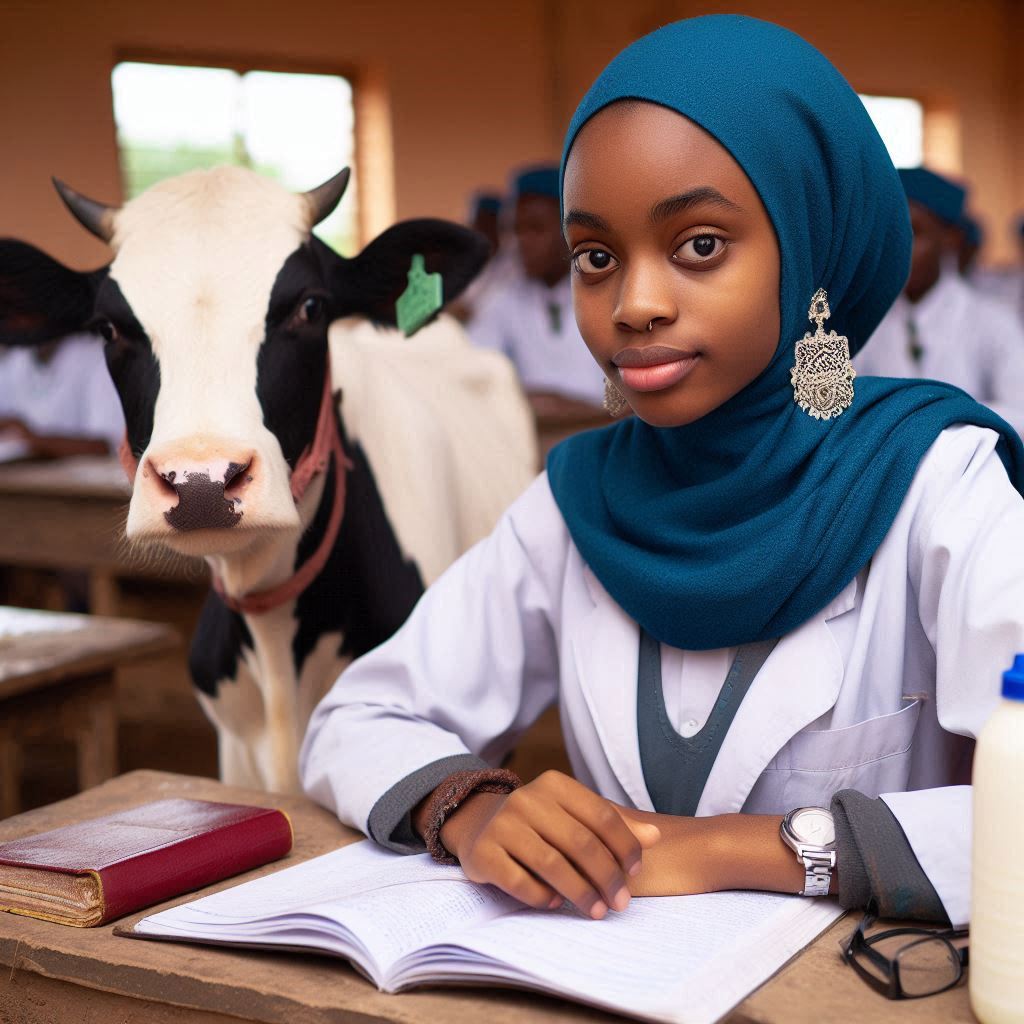Introduction
Animal husbandry plays a crucial role in Nigeria’s agricultural sector. Integrating this field into education enhances students’ understanding of sustainable farming.
Nigerian schools now incorporate animal husbandry into their curricula, fostering practical skills.
Students learn to raise livestock efficiently and sustainably. This education includes breeding, feeding, and disease management practices. Nigerian education aims to equip students with essential agricultural skills.
Introducing students to animal husbandry offers several benefits. It promotes self-sufficiency and reduces unemployment. Students gain hands-on experience that can lead to entrepreneurship in agriculture.
Understanding animal husbandry helps students appreciate the significance of livestock in Nigeria’s economy. They learn to manage resources effectively. This knowledge ensures they can contribute to food security.
Students engaging in animal husbandry programs gain valuable skills, enabling them to excel in diverse agricultural careers.
Incorporating animal husbandry into education bridges the gap between theory and practice. Students become adept at solving real-world agricultural problems. This approach prepares them for future careers in agriculture.
Animal husbandry education in Nigeria empowers students, fostering responsibility towards livestock and the environment. This initiative is vital for Nigeria’s agricultural progress.
History of animal husbandry in Nigeria
Animal husbandry has a rich history in Nigeria, dating back to ancient times. Traditionally, various tribes across the country engaged in livestock rearing as a means of sustenance and trade.
Traditional Practices
- Indigenous tribes like the Fulanis were known for their expertise in cattle herding.
- Herbal remedies were used to treat sick animals, passed down through generations.
- Animals were reared in open grazing lands, with minimal infrastructure for housing.
- Pastoralists moved their livestock across vast distances in search of water and pasture.
Evolution of Modern Animal Husbandry Techniques in Education
- With the advent of modern education, animal husbandry became a formal subject in schools.
- Curriculum included topics on animal nutrition, breeding, and disease management.
- Students were taught scientific methods of livestock production and management.
- Hands-on training in animal husbandry practices became a common feature in agricultural schools.
Today, animal husbandry plays a crucial role in the agricultural sector of the Nigerian economy. The integration of modern techniques with traditional practices has led to increased productivity and efficiency in livestock production.
As the country continues to strive for self-sufficiency in food production, education in animal husbandry will play a vital role in ensuring sustainable agricultural practices and economic growth.
Benefits of incorporating animal husbandry in education
Animal husbandry, the branch of agriculture concerned with the breeding and raising of livestock, is a crucial aspect of education in Nigeria.
Hands-on learning experience
- Students gain practical knowledge by working directly with animals.
- They develop a deeper understanding of animal behavior and husbandry practices.
- Hands-on experience fosters a sense of responsibility and empathy towards animals.
Skill development in agriculture and livestock management
- Students acquire skills in animal care, feeding, and health management.
- They learn about breeding, reproduction, and genetic improvement of livestock.
- Practical knowledge in agriculture and livestock management enhances future career opportunities.
Incorporating animal husbandry in education not only benefits students but also contributes significantly to Nigeria’s agricultural sector.
By providing hands-on learning opportunities and developing valuable skills in agriculture and livestock management, educational institutions can prepare students for successful careers in the field of animal husbandry.
Read: Nigerian Universities Offering Adult Education Courses
Challenges in implementing animal husbandry in Nigerian schools
Several challenges hinder the implementation of animal husbandry in Nigerian schools, limiting its effectiveness in education.
Lack of resources and funding
One of the major challenges is the insufficient resources and funding needed to establish and maintain animal husbandry programs in schools.
This includes lack of proper infrastructure, equipment, and supplies for students to learn and practice animal husbandry effectively.
Without adequate resources, it becomes difficult for schools to provide hands-on experience for students and offer a comprehensive education in animal husbandry.
Limited access to training and expertise
Within the educational system, a challenge emerges due to the scarcity of qualified trainers and experts in animal husbandry.
Many schools struggle to find skilled professionals who can teach students the necessary knowledge and skills in animal care and management.
Without access to proper training and expertise, students may not receive a quality education in animal husbandry, which can limit their understanding and practical experience in the field.
Current initiatives promoting animal husbandry in education
In recent years, there has been a growing awareness of the importance of integrating animal husbandry into the education system in Nigeria.
This has led to various initiatives being implemented to promote this practice among students at different levels of education.
- Government programs: The Nigerian government has taken significant steps to promote animal husbandry in schools. This includes the integration of animal husbandry as a subject in the curriculum, providing funding for the establishment of school farms, and training teachers in this field.
- Partnerships with agricultural organizations: Many agricultural organizations have partnered with schools to promote animal husbandry. These organizations provide technical support, training, and resources to help schools set up and maintain animal farms. They also organize workshops and seminars to educate students and teachers about the benefits of animal husbandry.
Transitioning from theory to practice, these initiatives actively equip students with practical skills in animal husbandry.
They promote entrepreneurship and raise awareness about the vital role of livestock farming in the economy.
By integrating animal husbandry into the education system, students are exposed to real-life experiences that prepare them for future careers in agriculture and related fields.
Read: How to Enroll in Adult Education Programs in Nigeria

Case Studies of Successful Animal Husbandry Programs in Nigerian Schools
In recent years, several Nigerian schools have implemented animal husbandry programs as part of their curriculum with great success.
One such school is Lagos Model Secondary School in Lagos, where students are actively involved in raising chickens, goats, and rabbits.
At Unity Primary School in Abuja, a thriving fish farming program engages students. They actively learn aquaculture practices and maintain school fish ponds.
These case studies demonstrate the positive impact that animal husbandry programs can have on students’ learning and engagement.
Impact on Student Learning and Engagement
Animal husbandry programs provide students with hands-on experience and practical knowledge that cannot be gained from textbooks alone.
By caring for animals and observing their behavior, students learn valuable lessons in responsibility, teamwork, and problem-solving.
Moreover, such programs cultivate students’ curiosity, igniting interest in the natural world and agriculture’s societal significance.
Students become more engaged in their education as they see the direct application of what they learn in the classroom to real-life situations.
Additionally, animal husbandry programs cultivate vital life skills in students, fostering time management, critical thinking, and communication.
Students can apply these skills to various aspects of their lives, enhancing their overall success and well-being.
Long-Term Benefits for Communities and Economy
Animal husbandry programs in Nigerian schools not only benefit students but also have lasting positive effects on communities and the economy.
By introducing young people to agriculture and animal husbandry, these programs help cultivate a new generation of skilled farmers and agribusiness professionals.
As students grasp sustainable farming practices, they can make informed decisions, contributing to community health and prosperity.
This, in turn, can lead to increased food security, economic growth, and job creation in rural areas.
Furthermore, animal husbandry programs foster environmental stewardship in students, promoting sustainable development and conservation efforts.
Students learn the importance of preserving natural resources and protecting biodiversity, which is essential for the long-term health of the planet.
In Nigerian schools, animal husbandry programs actively enhance student learning, engagement, and long-term benefits to communities and the economy.
By investing in such programs, we are investing in the future of our youth and the sustainability of our society.
Read: Key Concepts in Nigerian Curriculum Studies
Future Prospects for Animal Husbandry Education in Nigeria
Animal husbandry education in Nigeria has a promising future ahead, as the demand for skilled professionals in the industry continues to grow.
With the increasing population and the need for sustainable food production, there will be an ongoing need for individuals who are well-versed in animal husbandry practices.
As the agricultural sector in Nigeria continues to evolve, there will be a greater emphasis on specialized knowledge and skills in animal husbandry. This presents an opportunity for growth and development within the field.
Opportunities for Growth and Development
One of the key opportunities for growth in animal husbandry education in Nigeria is the potential for increased collaboration with industry stakeholders.
By working closely with farmers, agribusinesses, and government agencies, educational institutions can ensure that their programs are aligned with the needs of the industry.
In animal husbandry, there’s a rising call for active research and innovative practices. Transitioning to new methods is essential.
As new technologies and advancements are made in the field, there will be a need for well-trained professionals who can implement these practices in a sustainable and efficient manner.
Moreover, as the global market expands for animal products, Nigerian farmers and agribusinesses seize opportunities to export their products.
Animal husbandry education plays a crucial role in preparing individuals to capitalize on these opportunities and compete in the international market.
Importance of Sustainability and Environmental Stewardship
With the increasing concerns about environmental degradation and climate change, there is a growing emphasis on sustainability and environmental stewardship in animal husbandry practices.
It is important for educational programs in Nigeria to incorporate these principles into their curriculum to ensure that future professionals are equipped to address these challenges.
Animal husbandry education actively promotes sustainable practices like pasture management, waste recycling, and water conservation. Consequently, it minimizes the environmental impact of livestock production.
This contributes not only to the environment but also ensures the industry’s long-term success and viability.
Additionally, fostering environmental stewardship in animal husbandry education cultivates responsibility and ethical practices among future professionals.
By instilling these values early on, educational institutions can help shape a new generation of leaders who are committed to sustainable agriculture and environmental conservation.
Consequently, Nigeria’s animal husbandry education forges ahead, presenting abundant prospects for expansion and advancement.
By emphasizing sustainability and environmental stewardship, educational programs can prepare individuals to meet the challenges of the ever-evolving agricultural sector and contribute to the sustainable development of the country.
Read: Comparing Formal and Non-Formal Education in Nigeria
Transform Your Career with Expert Guidance
Get personalized mentorship consulting that’s tailored to your unique path. Our expert advice is actionable and exclusive.
Get StartedConclusion
Animal husbandry significantly contributes to Nigerian education, equipping students with practical skills and knowledge. Consequently, students gain valuable experience.
Students engaging in animal husbandry programs gain valuable skills, enabling them to excel in diverse agricultural careers.
It is important to recognize the importance of animal husbandry in preparing the next generation of farmers and agricultural professionals in Nigeria.
Recap of the significance of animal husbandry in Nigerian education
Students gain hands-on experience, learning responsibility, care, and sustainability. Furthermore, they efficiently manage livestock, enhancing practical skills.
This approach ensures students grasp essential agricultural practices, fostering a strong sense of responsibility.
By investing in agricultural education programs that include animal husbandry, we are investing in the future of Nigeria’s agriculture industry.
It is crucial to continue supporting and expanding animal husbandry initiatives in schools to ensure a skilled workforce for the agricultural sector.
Call to action
We urge government officials, private organizations, and individuals to prioritize animal husbandry in educational curricula and funding allocations.
Supporting agricultural education programs that incorporate animal husbandry will help to bridge the skills gap in Nigeria’s farming sector.
Let us work together to empower Nigerian students with the knowledge and skills needed to succeed in the agricultural industry through animal husbandry.




